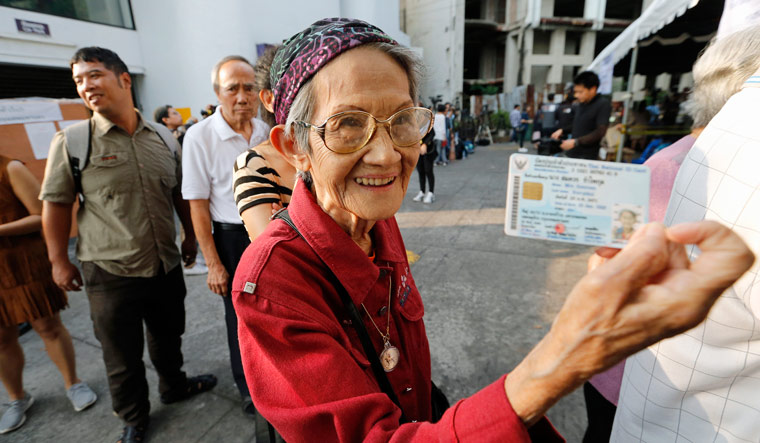In the first election since the 2014 coup, Thais throng schools, temples and government offices to vote.
All television stations repeated the rare statement by King Maha Vajiralongkorn moments before polls opened, where he urged people to support good leaders to avoid chaos. The election pits a royalist junta and its allies against the election-winning machine of billionaire ex-premier Thaksin Shinawatra and an unpredictable wave of millions of first-time voters. The kingdom remains bitterly divided despite the ruling junta's pledge to rescue it from a decade-long treadmill of protests and coups. Under election rules written by the junta, politicians across the spectrum fear a stalemate, as these rules limit the chances of any single party emerging with a comfortable parliamentary majority.
Junta leader Prime Minister Prayuth Chan-ocha was among the first to vote. He arrived arriving in a Mercedes, after polling booths opened at 8 a.m. The political set-up did not stop enthusiastic voters from turning out across the country, from ethnic Malay Muslims in the Deep South to residents in Thaksin's hometown of Chiang Mai. There are 51 million eligible voters and more than 7 million first-timers aged 18-25, adding a dash of uncertainty into the count. “I want to see Thailand become more democratic and inequality eased from society,” said insurance company employee Pattrapong Waschiyapong at a Bangkok polling station. The palace statement, unprecedented on an election eve in recent history, added further intrigue to a vote that has repeatedly threatened to tip into chaos before a single ballot was cast.
The elections seek to end five years of military rule. It remains to be seen if it truly will do that or give way for a new phase in military misrule. Voter in this election seek to foil Thaksin Shinawatra, whose supporters have won every election since 2001.
A royal command torpedoed the candidacy of his elder sister Princess Ubolratana for prime minister of a party linked to Thaksin, a divisive ex-premier toppled by a 2006 coup. Thaksin has lived in self-exile since 2008, but he looms large over Sunday's election. His affiliated parties have won every Thai election since 2001, drawing on huge loyalty from rural and urban poor. In Bangkok Sudarat Keyuraphan, the prime ministerial candidate for the largest Thaksin-linked party Pheu Thai, noted the “euphoria” at the ballot box. Pheu Thai is expected to again sweep up the north and northeastern heartlands as it seeks to head an anti-junta coalition.
A 250-member junta-appointed senate and a new proportional system were meant to have manoeuvered Prayut and the junta party -- Phalang Pracharat -- into pole position. With senate votes in hand, the party needs just 126 lower house seats to secure a parliamentary majority. It can cross that line comfortably in alliance with smaller parties. Pheu Thai, however, needs 376 lower house seats to command an overall majority -- near impossible without complex tie-ups across pro-democracy factions.
“A deadlock is very likely,” political scientist Napisa Waitoolkiat of Naresuan University said. But Pheu Thai lacks star power without the Shinawatra duo in the running and many younger voters are enamoured by telegenic billionaire Thanathorn Juangroongruangkit. The political newcomer's Future Forward party was created last year and has won fans with strong social media messaging and anti-junta stance. Others with less clear cut loyalties could play a decisive role, including the Democrats led by former premier Abhisit Vejjajiva.


